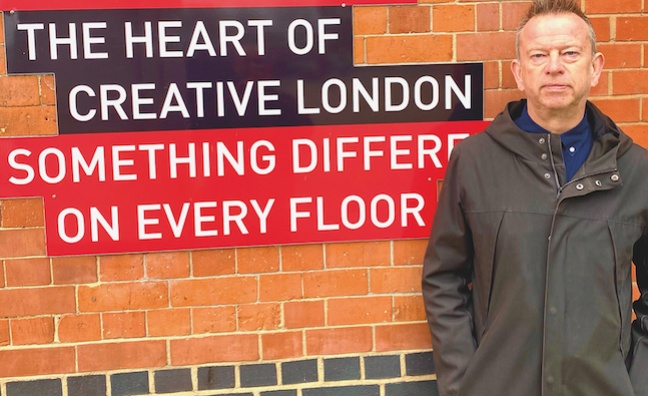Music Venue Trust CEO Mark Davyd says that Nadine Dorries is the first Culture Secretary to decline a meeting since 2014.
He has used his latest Music Week column to voice his alarm at the treatment of the sector, and make the case for a VAT cut. The two-year period of reduced sales tax on concert tickets and the hospitality sector is set to end this month.
The Treasury is now set to bring VAT on concert tickets back up to 20% at the end of March, despite the impact of the pandemic on grassroots venues. Here, Davyd makes an urgent appeal to the government to change course…
In April, Britain will return to having the third highest rate in Europe of VAT on cultural ticketing: 20%. In Britain, which can justifiably claim to be one of the most musically important countries in the world, audiences pay more to the government in taxes to see their favourite artist than anyone anywhere else in Europe, except Denmark and Lithuania.
Within the EU, exemptions are permitted from unified tax rules on VAT. All of our music competitors take advantage of those available exemptions to reduce the rate of VAT on culture ticketing, except Denmark, Lithuania, and Estonia. With apologies to colleagues in those countries, these are hardly comparable powerhouses of music. Britain is unique in the world in imposing high levels of taxation on one of its leading industries in this way; every other country in the world follows a policy of seeking to give a trading advantage to its most significant sector. Low taxation in cultural industries, particularly in live creativity, leads to investment.
Music Venue Trust first brought this position to the attention of the then Secretary of State for Culture, Media, and Sport, Sajid Javid, in February 2015. We requested that the UK government reduce the rate of VAT on live music tickets to an equitable and reasonable 5%, at least mirroring the advantage felt by our nearest competitors in France, Belgium, Germany and the Netherlands. We laid out exactly how this would benefit artists starting their careers, how VAT impacted on the ability of grassroots music venues to invest in new talent, and how a taxation on the grassroots sector was inherently bad taxation.
Grassroots music venues are the research and development departments of the music industry
Mark Davyd
Grassroots music venues are the research and development departments of the music industry. No sensible government taxes research and development. It’s simply counterintuitive to developing future economic activity. How can we impress upon the government that this is the case? Because in the UK, the government doesn’t seek to tax most research and development.
In fact, we offer huge tax incentives to undertake research and development precisely because we know it generates future economic activity from which we all benefit. R&D relief allows companies to deduct an extra 130% of their qualifying costs from their yearly profit, as well as the normal 100% deduction, to make a total 230% deduction. In case those numbers are a blur: for every £1 you spend on research and development, you can claim £2.30 off your tax bill. If you’re making a loss, you can claim a tax credit worth up to 14.5% of that loss.
Unless, it seems, you’re undertaking research and development in the music industry. Because the government has chosen not to extend that tax relief to the creative industries. Our research and development costs not only don’t count for tax relief; the government chooses to impose 20% VAT on them.
Let’s not mince words. In 2015, Sajid Javid wasn’t interested in our presentation on VAT. We pursued the point with his successors, John Whittingdale and Karen Bradley, in 2016 and 2017 respectively. They also weren’t interested.
The Prime Minister is currently trying to persuade us of the ‘benefits of Brexit’. It’s fairly well-known that the music industry overwhelmingly felt that Brexit was an unmitigated disaster, for live touring in particular, but we all have to deal with the reality of it and look for opportunities to make it work. A national setting of VAT rates could be that.
So, post-Brexit, Music Venue Trust asked each of the Department For Culture, Media and Sport department heads in turn, Matt Hancock, Jeremy Wright, Nicky Morgan, and Oliver Dowden to take advantage of the UK’s position outside the EU to set its own VAT rate on gig tickets. If Brexit was about trading advantages, here was an obvious one: set our VAT rate lower than our competitors and give our musicians, crew, promoters and venues more of the money they raise to invest in building their careers.
Reader, I’m sure you can guess: none of them were interested.

Mark Davyd with Frank Turner at the 2021 Music Week Awards
At the beginning of the pandemic, the government reduced VAT on tickets to 5%, hailing this as a vital way to support the cultural ecosystem during the pandemic. The general rate in France was 5.5% before the pandemic. In a crisis, where there were unlikely to be any tickets sold (and there weren’t), the government’s support on the issue of taxation of ticketing was to offer to do what they could have done anyway at any time, but only to the extent of being as supportive of its creative industry as France is all the time. And less supportive than Norway (0%) and Switzerland (2.5%) have been for the last decade.
When she was appointed, MVT sent all these facts to Nadine Dorries, the latest appointment to lead DCMS. We have provided the detail on tax rates to eight Secretary Of State post-holders, and for five years have been telling them exactly what a ‘Brexit benefit’ for British music looks like. None of them have been interested, and Dorries won’t even meet to discuss the point – she’s the first post-holder to decline a meeting with MVT since 2014.
Brexit is a reality and we have to deal with it as best we can. Its highest impact is felt by live industries, who are seeing crippling levels of bureaucracy, compliance, new taxation, and employment rules. That is a Brexit disaster the government can’t do anything to mitigate because they chose this path. But it is truly astonishing that they won’t do any of the things that Brexit was, ultimately, supposed to be about – things that might help to ameliorate the problems that Brexit caused.
The choice is clear: the government can cut VAT on concert tickets to 5%. Or they can stop pretending that they have any intention of supporting the creative industries, or of making Brexit work for us.










